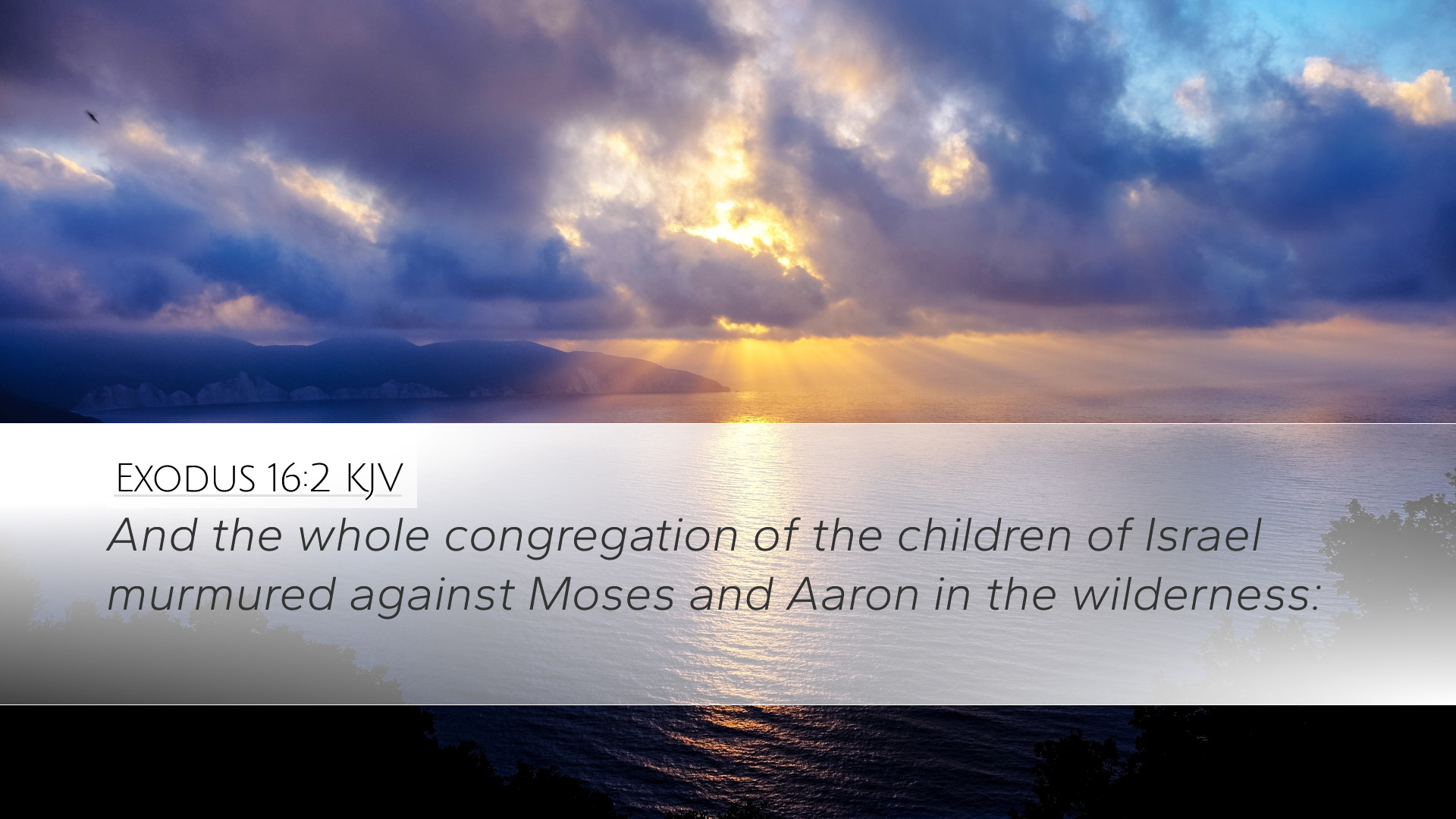Commentary on Exodus 16:2
Verse Reference: Exodus 16:2 - "And the whole congregation of the children of Israel murmured against Moses and Aaron in the wilderness."
Contextual Background
In the preceding chapters of Exodus, the Israelites have experienced miraculous deliverance from Egypt. They witnessed the plagues, crossed the Red Sea, and now find themselves in the wilderness, a place of trial and testing. They had just experienced the glorious event of the Red Sea crossing. However, their newfound freedom is quickly met with challenges that test their faith and commitment to God.
Insights from Matthew Henry
Matthew Henry highlights the significant theme of discontent amongst the Israelites. He notes, "The people murmured against Moses and Aaron." This reflects a deeper spiritual malaise where, despite witnessing God's miraculous works, their immediate challenges lead them to forget His providence and care. Henry indicates that murmuring is a common sin among God’s people, originating from a lack of faith and gratitude.
He emphasizes the importance of unity among leaders during trials, suggesting that Moses and Aaron faced unjust blame, an observation that reflects human nature's tendency to seek a scapegoat during hardships. This murmuring not only reveals the people's hearts but also serves as a warning against the dangers of ingratitude and self-pity.
Commentary by Albert Barnes
Albert Barnes expounds on the gravity of the people's complaints, asserting that their dissatisfaction stems from their basic needs not being met. He comments on how the wilderness poses a challenge for survival, and their cry for food indicates a lack of trust in God’s provision. Barnes interprets this murmuring as a loss of faith, contrasting the former miracles they experienced against the complaints of their current predicament.
Barnes adds that God uses such moments of distress to draw His people back to Him. The verse invites readers to examine their trust in God's plan, asserting that their complaints were not just against Moses and Aaron, but ultimately against God Himself, who led them there. Trust amidst trials is a vital lesson exemplified in Jewish history.
Reflections from Adam Clarke
Adam Clarke elaborates on the dynamics of leadership during times of crisis. He notes, "The whole congregation murmured," emphasizing that discontent is often communal rather than individual. Clarke suggests that communal dissent can quickly spread, leading to widespread disillusionment.
Furthermore, Clarke points out how disappointment can lead people to forget the past blessings. The Israelites had just been liberated from bondage, yet their immediate reaction to hardship was to revert to a mindset of distrust. Clarke’s commentary encourages readers to resist the temptation to let present struggles overshadow God's past faithfulness and goodness.
Theological Implications
- The Nature of God’s Provision: The murmuring in Exodus 16:2 serves as a pivotal moment that introduces the theme of divine provision, which culminates in the giving of manna. God’s response to complaint is not to abandon His people, but to provide for them, demonstrating His enduring mercy.
- The Reality of Human Discontent: This verse reflects a fundamental truth about human nature: in times of trial, we are prone to shift blame and express dissatisfaction. These reactions reveal deeper issues of faith and understanding.
- The Role of Leadership: The complaints against Moses and Aaron illustrate the weight of leadership in spiritual matters. Leaders often bear the burden of their followers’ perceptions and complaints, which can distract from their ultimate purpose of guiding people towards trust in God.
- Testing and Faith: The wilderness experience is a recurring theme in Scripture, symbolizing a period of testing. The Israelites' complaint can be viewed as a test of their faith, calling attention to the necessity of maintaining trust in God during difficult times.
Practical Applications
From this commentary on Exodus 16:2, several lessons emerge:
- Maintain Gratefulness: Believers are encouraged to cultivate a spirit of appreciation for God's past provisions and to trust Him for future needs.
- Expect Trials: Understanding that trials are part of the Christian journey can prepare believers to face challenges without losing heart or turning against leadership.
- Unity in Leadership: Encouraging unity among church leadership can safeguard against discontent and murmuring, fostering an environment where faith can flourish.
- Revisiting God’s Faithfulness: Regular reflection on God's past faithfulness can fortify believers against present discontent and provide assurance during future uncertainties.
Conclusion
Exodus 16:2 serves as a powerful reminder of the human tendency to complain and the importance of faith, especially in trials. The insights from Matthew Henry, Albert Barnes, and Adam Clarke bring forth a rich tapestry of theological reflections, encouraging a deeper understanding of God's provision, the nature of human discontent, and the responsibilities of believers amidst hardship. Ultimately, this passage calls for a heartfelt commitment to trust in God, recognizing His unchanging nature in both abundance and need.


